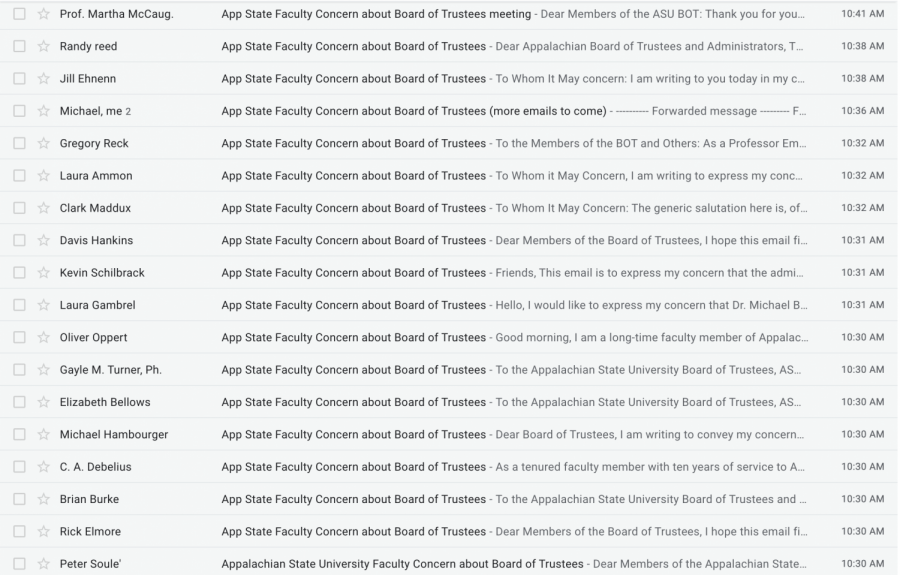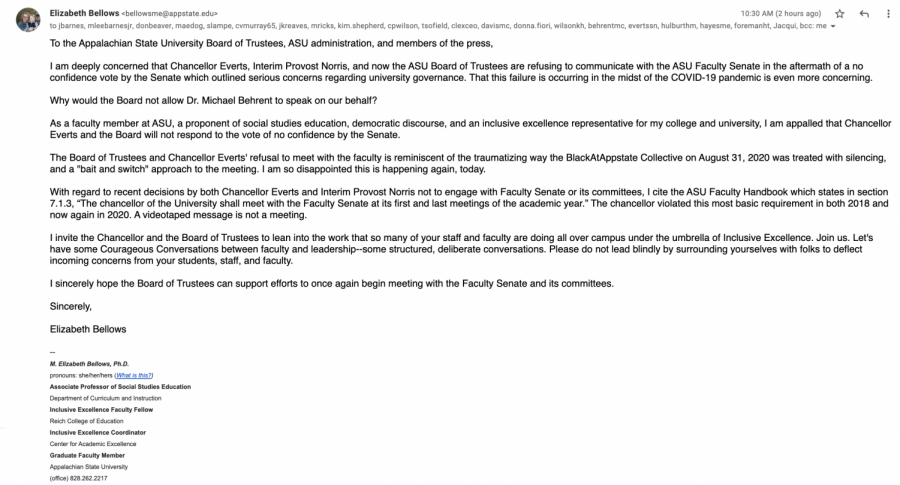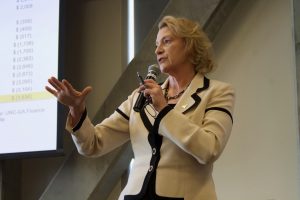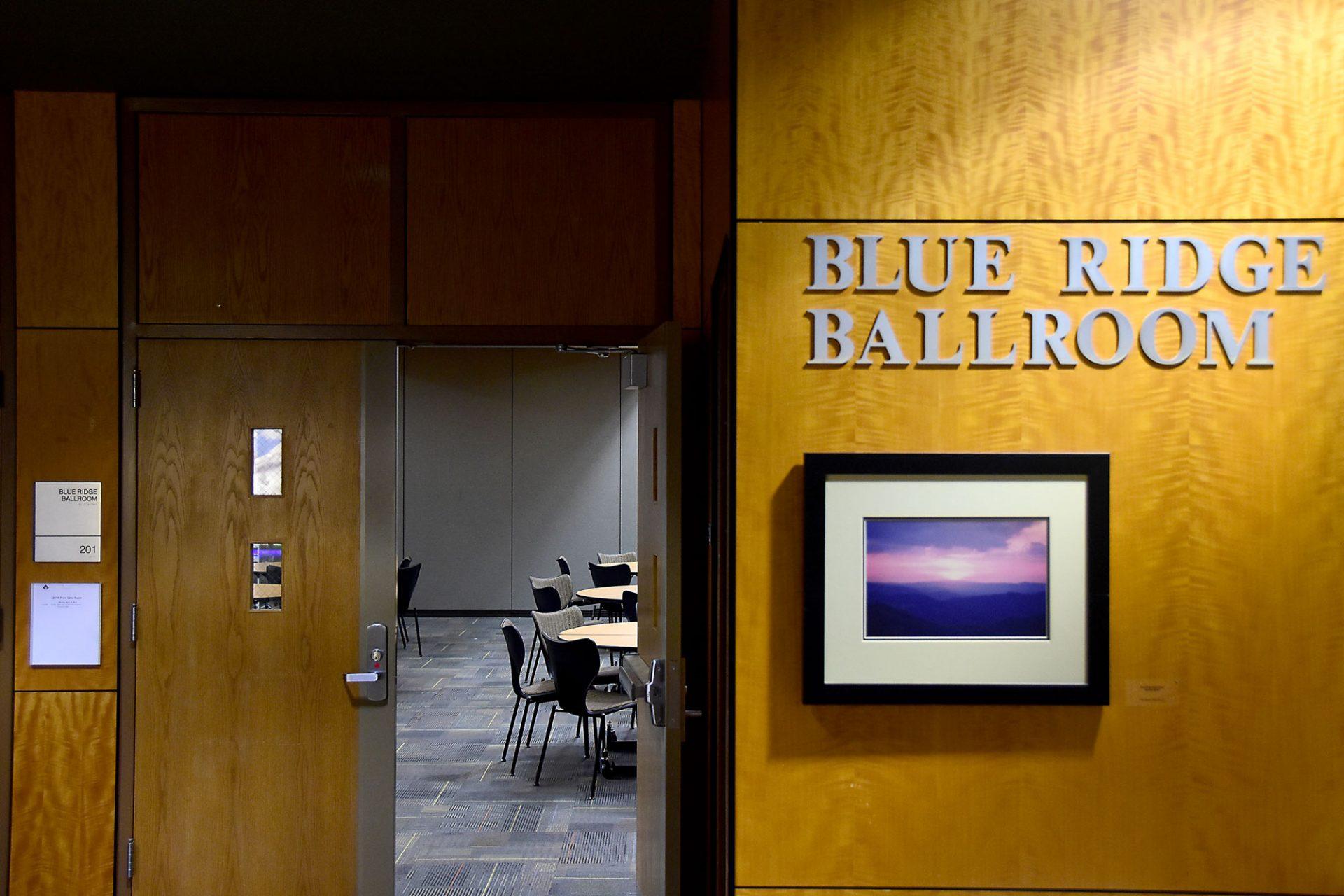Faculty Senate members flood inboxes of board of trustees, administration for lack of communication
September 25, 2020
Members of the App State Faculty Senate flooded the emails of members of the board of trustees and members of university administration after the board declined a request from Faculty Senate Chair Michael Behrent to speak at the board’s meeting.
On Monday, Behrent requested five minutes at Friday’s BOT meeting to give a report on faculty senate as consistent with his position as chair and part of the bylaws of the board, which states that agenda items must be filed with the chancellor with sufficient time before the meeting for her to make a determination on the item.
Hank Foreman, vice chancellor and chief of staff for Chancellor Sheri Everts, wrote to Behrent on Tuesday that the board thanked him for his request and declined it.
“The situation at our university … is a striking example of rising levels of distrust at universities amid COVID, the decline of shared governance, and the ways in which economic and political imperatives are being prioritized over safety concerns,” Behrent wrote in an email.
Twenty-one faculty members, department chairs and other members of the senate expressed feelings of separation from the chancellor and board members in their emails to Everts, Interim Provost Heather Norris and members of the BOT.
“It is poor optics to refuse to engage with the Faculty Senate in the midst of a pandemic, and following the faculty’s voicing serious concerns about shared governance of the university,” wrote Martha McCaughey, vice chair of the senate.
In late August, the senate passed a resolution of no confidence in Everts’ leadership because the chancellor is “frequently isolated from and unable to effectively communicate with faculty” and has failed to strengthen the university’s finances, make transparent decisions, and unify the university community, according to the resolution.
McCaughey wrote that the faculty senate wants to work with the board and administrators to improve App State.
Rick Elmore, an associate philosophy professor, wrote that “people of good conscience can disagree,” and that has been the case between faculty, staff, students and administration for years.
He said that one major concern the faculty senate has expressed is a lack of shared governance between the administration and faculty.
“Without communication the very possibility of agreement or shared governance is undone in advance,” Elmore wrote. “All we are asking is that you allow us the space to express our thoughts and concerns to you via our elected representative.”
Elmore said that faculty members would welcome and appreciate a meeting with the board and administration to discuss their concerns.
“Such a meeting would not only be a generous act on your part, but would go a long way to making faculty feel as though our perspectives are valued and heard,” he said. “It is my sincere hope that faculty, the administration, and the Board can find constructive ways to work together for the good of Appalachian State.”
After the board’s meeting adjourned, Behrent emailed a video to BOT and university administration with the subject line “App State Faculty Senate: The Remarks I Was Not Allowed to Make at Today’s BOT.”
In the video, Behrent said he applauded the board for their work in a challenging time. But, he said, there was “one surprising oversight:” a lack of reference to the work faculty has done.
Behrent noted that the university’s 1,400 faculty members are constantly with students on their assignments, research and preparations for the professional world. Outside the classroom, Behrent said faculty are constantly working on research, writing, grant applications and presentations of their own, all to ensure “that the name Appalachian State University is known in scholarly communities across the world.”
“But in your meeting, regrettably, it barely registers,” he said.
Megan Hayes, spokesperson for the university, said the board values App State’s faculty and “holds their teaching, research and service in high regard.”
“On Monday, Dr. Behrent requested an addition to the board’s agenda, which was declined. As a constituency representative to the board, Dr. Behrent has the ability and freedom to engage with the board, and indeed does so regularly,” Hayes said.
Behrent said that this lack of communication is even more surprising at a time like this one: during a pandemic. A time when college campuses are becoming hotspots for COVID-19, and higher education’s economic prospects are “perilous.”
He also noted that universities are an important point of the “cultural and political turmoil” occurring in society today.
“Your lack of engagement with faculty in this context is not accidental. It is a conscious choice,” Behrent said.
Behrent then described his denied request to speak at the Friday meeting, and said this refusal is the culmination of a “nearly 10-month refusal on your part to listen to me, and most importantly, to the faculty.”
Last year, Behrent connected with the board’s new chair, John Blackburn. Since that time, however, he says the board has not been able to consistently meet with the senate, despite Behrent’s consistent requests.
He said that there is no doubt that the reason why the board has not consistently met with faculty is because faculty disagree with BOT on several issues.
“I am not expecting that you agree with us on any or every issue,” Behrent said. “I am simply saying that if you want to have a comprehensive understanding of the institutions you serve, it is in your interest to understand the positions and insights of those who fulfill the university’s core mission.”
He concluded his statement by making several requests. First, he asked that between now and the Dec. 4 meeting of the board, that they allow the senate to arrange a meeting between themselves and the board.
“I promise an open meeting, in which senate and non-senate representatives will be included, and one that will represent faculty from across the campus,” he said.
He also requested that a regular update from the senate chair at BOT meetings becomes a regular practice.
“It is in the interest of the institution’s health that the board be regularly informed of the issues that faculty are concerned with,” Behrent said.
This story has been updated with a comment from University Communications.
Gianna Holiday contributed to this story.

















